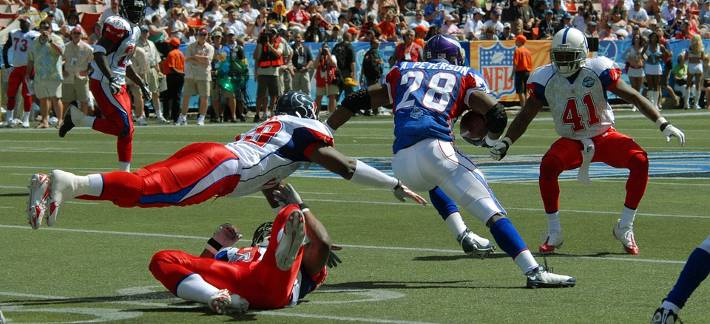Team sports, American style
 Europeans
play
football, and Americans play football; but surprisingly they do not
play the same game. American football is played by men (and
occasionally women) wearing helmets
and protective clothing; the ball is oval. European football
is
played with a round ball, by people wearing just socks, shorts, a
shirt, and football boots.
Europeans
play
football, and Americans play football; but surprisingly they do not
play the same game. American football is played by men (and
occasionally women) wearing helmets
and protective clothing; the ball is oval. European football
is
played with a round ball, by people wearing just socks, shorts, a
shirt, and football boots.
We Americans have another popular outdoor game too; baseball - a classic American game, that is only played seriously in North America. In Britain, a few people play an "ancestor" of baseball, called "rounders" - but it is not a popular sport.
In today's "global village", lifestyles have become international. Often the American model has spread to other countries of the world. American sports, however, have not spread all over the world, as American films and American fashions have. On the contrary, European sports have been more successful internationally. Indeed European football is slowly developing in the USA (where we call it "soccer").
In
motor racing
too, though it is not really a team sport, the USA is different. In
Europe, South America, Japan and other countries (including Canada),
"motor racing" means "Formula 1"; in America we have IndyCar racing.
The Indianapolis
500 is like a Formula 1 race, but different. Several famous
Formula 1 drivers - including Nigel Mansell and Jacques Villeneuve -
have won the race. On the other hand, no American IndyCar drivers have
ever been Formula 1 champions. Nevertheless, Americans are beginning to
discover Formula 1 racing, since the first American Grand Prix.
Besides these big sports, America of course has basketball - perhaps the most successful "export". Invented at Springfield College, Massachusetts, in 1891, Basketball is quite certainly an "American game". Although it is not as big in Europe as in the USA, basketball has become much more popular in other countries than any other American team sport.
WHY IS AMERICA DIFFERENT?
The answer is simple. Until the 1960's, team sports were not played on a global scale. In Europe, people played European games, and in North America we played American games. The only real "global" sports were individual sports, such as golf and tennis.
A
hundred years
ago, individual rich Americans could travel to Europe on holiday, and
play these two games. But whole teams of sportsmen did not often travel
around the world, it was too difficult and slow!
The first worldwide
sports competition was the Olympic Games; but originally the Olympics were
only concerned with athletics; they did not include
the wide variety of sports that they now cover.
So as far as team sports are concerned, America has grown up with its own tradition; we love our "football" and our baseball and our basketball. We don't mind if these sports are not popular in other countries. That way, we can organise the "World Series" baseball championship, knowing that a US team will almost always win. From time to time, a Canadian team wins.... but they're North Americans too, after all.
WORDS A-Z :
besides: in addition to - don't mind: are not worried - helmet: hard hat - on a global scale: all over the world - were only concerned with: only included.
Copyright © Linguapress. Do not copy this document to any other website
Copying permitted for personal study, or by teachers for use with their students.
Student worksheet
Sports American style
Interactive exercise : complete the following sentences in your own words, using information from the article. Add as many words as you want between the head prompt and the tail words. The "write here" space will expand as you write
Teachers:
Vocabulary:Use this article as a pretext for exploring sporting vocabulary: how many words of sporting vocabulary can students find in the article?
Grammar
Note the repeated use of the present simple passive form is played towards the beginning of this article. Students may find it useful to use passive structures in some of the sentences to complete in the exercise above.
This text is also a good illustration of use of the present perfect tense, as in have become, has spread, etc. For a clear explanation of this tense and its uses, with more examples, see A Descriptive Grammar of English section 1.4.3.
Other ideas?
EFL teachers: Help develop this resource by contributing extra teaching materials or exercises.
To contribute click here for further details
This teaching resource is © copyright Linguapress renewed 2022.
Republication on other websites or in print is not authorised
| Linguapress home | English grammar | Discover Britain |

 Level -
intermediate.
Level -
intermediate.
